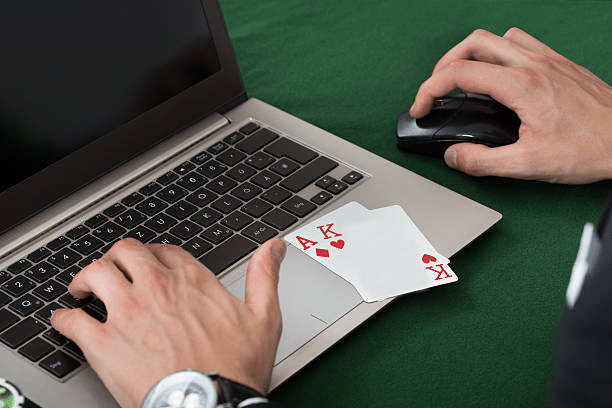With its easy access, online poker has gained immense popularity over recent years. Although becoming an expert at it can be a tough task, with dedication and practice, it is definitely achievable. This article provides tips and tricks to help you begin your poker journey. From learning basic strategies to mastering advanced techniques, we have everything you need to know about how to become a master poker player. Let’s get started!
Photo by iStockphoto
Table of Contents
1. Setting Up Your Poker Bankroll
Before playing online poker, it’s important to establish a poker bankroll. Set aside a specific amount of money solely for online poker and stick to it. This will help with financial management and prevent excessive losses. Furthermore, avoid utilizing your poker winnings for non-poker expenses, as this may lead to problematic gambling habits. Lastly, decide on a maximum loss limit per session and stop playing once you reach that point.
2. Understanding Starting Hands
Now that you have a poker bankroll, the first step in learning how to play poker is understanding your starting hands. Starting hands are the cards you are dealt at the beginning of a round. Knowing which cards to play is crucial, as it will minimize your losses and potentially increase your chances of success.
Generally, you should only play premium hands such as big pocket pairs (Aces, Kings, Queens, and Jacks) and high suited connectors (Ace-King, King-Queen, etc.). Big pairs are quite strong by themselves, while high suited connectors have a decent chance of turning into a strong hand such as a straight, flush, or straight flush.
Avoid playing hands like offsuit 2-7, where the suits are different and there is a large gap between the cards. You won’t be able to make a straight or flush, and it’s very unlikely that you will make a good hand.

Photo by iStockphoto
3. Learning Beginner Strategies
Out of the four play styles in poker, the most recommended for beginners is the tight-aggressive approach. Playing tight means only playing hands with a high chance of success and folding when unsure, and playing aggressive means betting and raising to control the pot instead of calling.
In addition, don’t be afraid to bluff (bet or raise without a strong hand) occasionally, as it can help you win more pots. Just make sure not to overdo it and keep an eye on how often you are bluffing. Semi-bluffing is a safer way of bluffing, where you bluff with a hand that could improve to win the pot.
4. Mastering Advanced Techniques
Once you’ve gained some experience, it’s time to move on to more advanced techniques. Check-raising is a technique that many expert players use. This is done by checking when it’s your turn to act, then re-raising after your opponent bets. This can be used for value or as a bluff, depending on your hand and the situation.
You should also practice pot odds calculations to determine whether calling is worth it. Convert your pot odds into a percentage by dividing the call amount by the sum of the pot and the amount you need to call. For example, if there is $20 in the pot and you need to call $5, then your pot odds are 20:5 or 4:1, which would be 20%.
Next, let’s calculate your chances of drawing a winning hand. Let’s say you have a 9-10, and the flop shows 4-7-8. Your outs to make a straight are four 6s and four Js, making a total of 8 outs. Let’s use the rules of 4 and 2 to calculate your chances of making the straight. Multiply your outs by 4 on the flop and 2 on the turn. In this case, it would be 8×4 = 32%.
Keep in mind that while 32% is bigger than 20% (your pot odds percentage). Although it is statistically more profitable to call in this situation, it doesn’t guarantee that you will win the pot. Observe your opponents’ tendencies, your stack size, and the board texture when making decisions to increase your chances of success.
5. Playing Free Poker
Many online poker sites offer free play options. These are great for beginners to practice and hone their skills without risking any real money. In addition, most sites offer freeroll tournaments, which are tournaments with no entry fee but real money prizes. Take advantage of free poker games online to build up your knowledge, experience, and confidence before moving on to the real money tables.

Photo by iStockphoto
6. Utilizing Software and Tools
One of the biggest advantages of playing poker online is the ability to use software and tools. The more common types are tracking software, HUDs, and odds calculators. Tracking software allows you to analyze your play and see where you need improvement; HUDs display the statistics of each player on the table, and the odds calculator helps you calculate pot odds and other probabilities. Most sites have these kinds of software built-in or available for download, but some don’t, so be sure to read the rules before downloading any third-party programs.
Final Thoughts
To become a master of online poker, you must learn the fundamentals and understand basic strategies. As your skillset deepens, move on to more advanced techniques like check-raising and pot odds calculations. Utilize the free play options and software tools available in order to facilitate your learning process.
With practice and dedication, you can take your game from zero to hero and become an expert at playing online poker. Once you’re ready, register an account at GG Poker, the world’s largest poker room, and start playing today!


